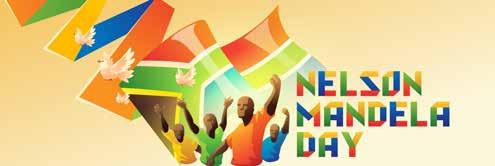DIVERSITY @Work
Our Mission is to foster and support an environment of inclusion, respect, fairness, and transparency, where differences are celebrated and all opinions are valued.
National Minority Mental Health Awareness Month
People in communities of color, women, and sexual minorities can face significant barriers in getting help with mental health challenges. A lack of high-quality mental health services, cultural stigma around mental health, discrimination, and other factors often stand in the way.
This month aims to raise awareness about the various experiences of people with mental health conditions in minority communities. It sheds light on the historical and systemic barriers that prevent people from being able to fully access proper care within their communities. The traumas and concerns that marginalized individuals, such as those with mental health conditions face, are distinct and require proper attention.
The theme of this year’s awareness month is Culture, Community, and Connection. We all can play a part in supporting people in these communities who face mental health challenges. Having empathetic and professional caregivers that are reflective of the community can also help.
In 2005, Bebe Moore Campbell and Linda Wharton-Boyd proposed ending the stigma surrounding mental health conditions and making facilities more accessible. They then created a monthlong initiative focusing on minority mental health. Campbell’s work inspired the initiative; she is an author and advocate who campaigned for better mental health care resources and education in disadvantaged communities. In turn, their efforts inspired Anthony Williams, the head of the D.C. Mental Health Department, to hold a press briefing urging residents to seek mental health evaluations.
The campaign gained widespread support over the next several years, with many people advocating to establish a national awareness month for minority mental health issues. They obtained the support of US Representatives Diane Watson and Albert Wynn, who introduced a bill establishing the month of July as National Minority Mental Health Awareness Month, first recognized in 2008.
Independence Day
The United States celebrates its 247th birthday this year! The country celebrates Independence Day with fireworks, picnics, parades, and barbeques, and this year will be no exception.

July 4, 1777, during the first organized celebration of Independence Day. In honor of the 13 colonies, all the ships in the harbor fired their cannons in a 13-gun salute.
ɑ Algeria 7/5
ɑ Venezuela 7/5
ɑ Malawi 7/6
ɑ Comoros 7/6
ɑ Solomon Islands 7/7
ɑ South Sudan 7/9
ɑ Argentina 7/9
ɑ Bahamas 7/10
July 4th commemorates the day that the Declaration of Independence was ratified by the second Continental Congress in 1776, establishing the United States of America. On this day, the founding fathers declared the 13 colonies free from the British monarchy as united and independent states.
The tradition of setting off fireworks on the 4th of July began in Philadelphia on
NON-BINARY DAY
First commemorated in 2012, International Non-Binary Day is celebrated around the world on July 14th. This day is used as a time to celebrate and highlight those around the world who identify as nonbinary and shine light on the diversity of the LGBTQ+ Community. Non-binary indicates that someone does not self-identify as either a man or a woman. People who self-identify as non-binary may identify as being both male and female or they may identify as being completely outside the spectrum of these gender groups. Some non-binary people also identify as being transgender.

This day is about celebrating and awareness, and it’s also a time to highlight the continued inequities that gender non-conforming people face across the globe.
What steps can you take to promote a more inclusive culture?
As we celebrate our independence as a country this year, we’re in good company. Other countries that also celebrate their independence in the month of July include:
ɑ Somalia 7/1
ɑ Rwanda 7/1
ɑ Canada 7/1
ɑ Hong Kong 7/1
ɑ Burundi 7/1
ɑ Belarus 7/3
ɑ Cape Verde 7/5
ɑ Sao Tome’ & Prinicipe 7/12
ɑ Kiribati 7/12
ɑ France 7/14
ɑ Slovakia 7/17
ɑ Columbia 7/20 (and 8/7)
ɑ Belgium 7/21
ɑ Maldives 7/26
ɑ The Netherlands 7/26
ɑ Liberia 7/26
ɑ Peru 7/28
ɑ Vanuatu 7/30
Using generic terms that are gender neutral is a great way to start. You can also put your pronouns in your email signature and on social media pages. Sharing your pronouns in this way shows your support of those who identify as non-binary, and also helps others see that the correct pronoun to use may not always be apparent.
To learn more, please see the following links:
www.hrc.org/news/celebrating-the-diversity-of-thenon-binary-community-for-international-non www.nationaltoday/ international-non-binary-peoples-day/
Did You Know?
In 1776, a genderless missionary whose birth name was Jemima Wilkinson discarded their birth name and gender pronouns and is regarded as the first person to identify as non-binary.
In 2021, Argentina became the first South Americans country to legally accept non-binary on all official documents
The United States still does not recognize non-binary as a gender at the federal level, but various states have taken this step.
NEWSLETTER May Institute’s Diversity, Equity, and Inclusion Council issue 23, 2023
Nelson Mandela Day is a global annual celebration that is held on July 18th of each year. It is a time for people, communities, and organizations to reflect on the values that Nelson Mandela brought to the world and reflect on how they can make positive change and significant impacts to their communities and the world. It is also a time to encouraged to come together to better our communities and continue the legacy that Nelson Mandela left on the world through his political and civil activism.
Who was Nelson Mandela?
Nelson Mandela was a political activist and the first black president of South Africa. In 1944, he joined the African National Congress, a political group that fought for equal rights between blacks and whites. In spite of their efforts, the government in South Africa implemented a system of apartheid in 1948. Under apartheid, black and white people were forced to live separately. Along with the African National
Congress, Mandela began advocating against the law of apartheid; his activism led to his arrest for treason in the 1960’s. During his time in prison, countries around the world began to put pressure on South Africa to free Mandela and end apartheid. Decades later, South African president FW De Klerk met with Mandela and set him free in 1990.
In 1991, Nelson Mandela became the president of the African National Congress and worked with De Klerk to end the system of apartheid in the country. For their groundbreaking work, they won the Nobel Peace Prize in 1993. The next year, all races in South Africa were eligible to vote, aand Nelson Mandela was elected the country’s first black president. Under his presidency, the standard of living from black South Africans greatly improved.
To learn more, please see the following links: www.mandeladay.com
www.natgeokids.com/uk/discover/history/ general-history/nelson-mandela/
NATIONAL DISABILITY INDEPENDENCE DAY


This Independence Day in the United States marks the 247th anniversary of the signing of the Declaration of Independence! Another federal day of remembrance held later in the month may not be as widely recognized, but it has had a powerful influence in the U.S. and especially in the communities we serve at May.
National Disability Independence Day takes place on July 26th will mark the 33rd anniversary of the signing of the Americans with Disabilities Act of 1990.
The disability movement began in the 1960’s, with Americans advocating to end the segregation of individuals with disabilities, pushing for full access for opportunities in employment, education, and within public life. By 1973, the first significant piece of legislation was introduced with Section 504 of the Rehabilitation Act, stating that any place that receives federal funds could not discriminate against people with disabilities.
The Americans with Disabilities Act was introduced in 1988. Its goal was to expand the rights of individuals with
International Self-Care Day
In a busy world with competing priorities, long days, and full schedules, it can be difficult to find time to care for ourselves. That’s even more true when our job involves taking care of others!
International Self-Care Day (ISD) is celebrated on July 24th each year, and it’s a reminder of the importance of finding time to care for ourselves. It was founded in 2011 by the International Self-Care Foundation. Since then, self-care activities for both

disabilities by ensuring their freedom from discrimination to employment, all levels of government, transportation, and communication. The bill was resoundingly passed by both levels of congress (327-28 for House of Representatives and 91-6 for the Senate.
On July 26, 1990, President George H. W. Bush signed the Americans with Disabilities Act into law. There is still so much work to be done. Did you know that 15% of people in the world are affected by a disability? One in five people in the U.S. has a disability. In the U.S., 70% of individuals with disabilities rely on family to assist them and 40% of them do not receive any assistance.
What can we do to celebrate National Disability Independence Day? As a May employee, you are already playing a crucial role in supporting this community and raising awareness of Americans with Disabilities! Many people are unaware of the discrimination that individuals with disabilities face each day.
body and mind linked to ISD have been organized around the world, in countries as far apart as Australia, Bangladesh, Bolivia, Brazil, Canada, China, Iran, Kenya, Mexico, Myanmar, Nepal, South Africa, South Korea, Sri Lanka, Switzerland, Tanzania, the United States, the United Kingdom, and Vietnam. Self-care is any action that we take to look after our own health, based on the knowledge and information available to us. This includes physical, social, mental, emotional, and spiritual health. Self-care can occur in collaboration with healthcare professionals when needed. Actively managing your own health and well-being through self-care has numerous benefits, including better physical health, a reduction in stress and anxiety, improved self-esteem, better mental health, and improved relationships with those around you.
There are many ways to focus on selfcare. Some of the more traditional ones include pampering yourself, splurging on treats, getting lost in nature, practicing mindfulness, focusing on mental health and wellness, or reaching out to a loved one. In our busy worlds, sometimes focusing on self-care feels like a luxury; however, selfcare is not selfish. As caregivers, we often forget that it’s difficult to care for others if we don’t take care of ourselves first. Even a small change can have a big impact on wellbeing.
This July 24th, try to make one small change to take better care of yourself.
The Diversity, Equity, and Inclusion Council wants your opinions, ideas, and feedback! Please email us at diversity@mayinstitute.org. If you believe you have been subjected to any kind of discrimination or to report DEI concerns, please call 800.887.4417 41 Pacella Park Drive, Randolph, MA 02368





